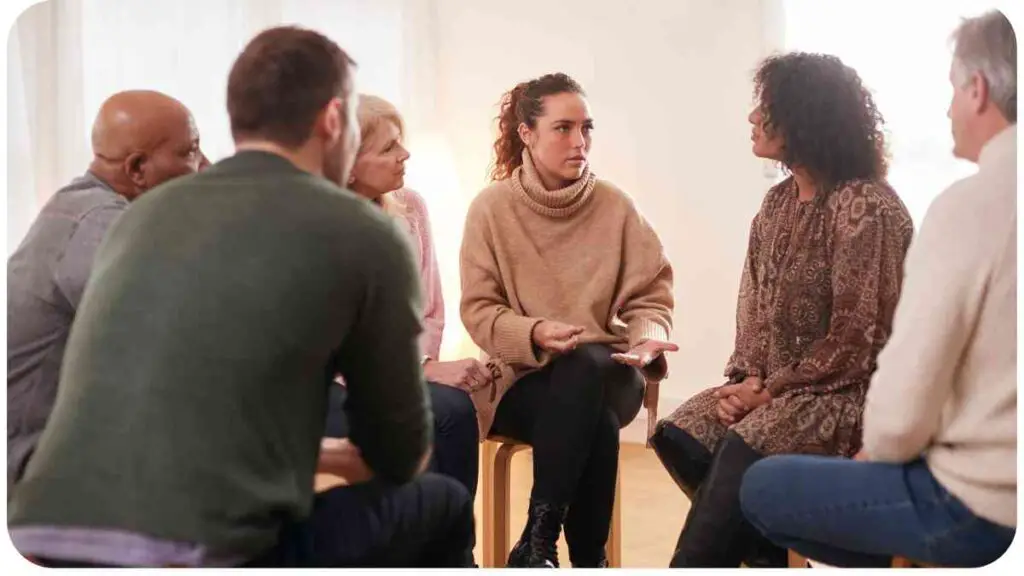Dealing with grief can be an overwhelming and challenging experience. When we lose a loved one or go through a significant loss, it is important to seek support and guidance to navigate the grieving process. Grief counselors play a crucial role in providing the help we need during these difficult times.
In this article, we will discuss the various ways to find a grief counselor, the types of grief counselors available, factors to consider when choosing one, and valuable tips and recommendations to help you in your search.
| Takeaway |
| Finding a grief counselor is crucial for navigating the grieving process and finding healing. |
| Consider the type of grief counselor that aligns with your beliefs, values, and goals for counseling. |
| Conduct thorough research and seek recommendations from trusted sources. |
| Ask relevant questions during initial consultations to assess the counselor’s expertise and compatibility. |
| Online platforms, support groups, and community centers offer accessible options for grief counseling. |
| Check your insurance coverage and explore financial considerations for grief counseling services. |
| Trust your instincts and choose a grief counselor who makes you feel comfortable and supported. |
Understanding Grief
Grief is a natural response to loss. It can manifest in various forms, including emotional, physical, and social symptoms. The grieving process is unique to each individual and can involve a wide range of emotions such as sadness, anger, guilt, and confusion. It is important to recognize that grief is a normal and healthy reaction, and seeking professional help can greatly assist in healing and coping.
Grief counseling can provide much needed support during difficult times of loss to explore whether counseling options such as individual therapy or support groups may help.
The Importance of Seeking Help
During times of grief, seeking the support of a grief counselor can be immensely beneficial. Grief counselors are trained professionals who possess the expertise and experience to guide individuals through the grieving process.
They provide a safe space for individuals to express their emotions, explore their feelings, and develop coping strategies. With their support, individuals can find solace, understanding, and healing.
Types of Grief Counselors

When searching for a grief counselor, it is essential to understand the different types available. Each type of counselor may specialize in a particular area and offer unique approaches to counseling. Here is a comparison of different types of grief counselors:
| Type of Grief Counselor | Description |
| Licensed Psychologist/Counselor | Trained mental health professionals who provide counseling services for individuals experiencing grief and loss. |
| Religious Counselor | Spiritual leaders from various faiths who integrate religious or spiritual beliefs into the counseling process. |
| Social Worker | Professionals who assist individuals with emotional and practical support during difficult times. |
| Therapist | Professionals trained in various therapeutic approaches who can help individuals navigate and process their grief. |
Table 1: Comparison of Different Types of Grief Counselors
Choosing the right type of grief counselor depends on your personal preferences and needs. It is important to identify which approach aligns with your beliefs, values, and goals for counseling.
Factors to Consider When Choosing a Grief Counselor
When selecting a grief counselor, there are several factors to take into consideration. Below are some questions that can assist you in making an informed decision:
Starting a local grief support group is a thoughtful way to connect with others experiencing similar struggles and foster healing in your community.
| Questions to Ask When Selecting a Grief Counselor |
| What is your experience in helping individuals with grief? |
| What type of counseling approach do you use? |
| Are you licensed or certified? |
| What is the duration and frequency of the counseling sessions? |
| What are the associated costs and payment options? |
Table 2: Questions to Ask When Selecting a Grief Counselor
It is important to find a grief counselor who not only meets your preferences but also possesses the expertise and qualifications necessary for effective counseling.
Research and Recommendations
Finding the right grief counselor can be a daunting task, but conducting thorough research can lead you to the right professional. Here are some recommendations and valuable insights to help you in your search:
Top Grief Counselor Services and their Features
| Grief Counselor Service | Features |
| Serenity Grief Counseling | – Licensed psychologists specialized in grief counseling.<br>- Individual and group counseling sessions.<br>- Online counseling options available. |
| Tranquil Spirits Counseling Center | – Experienced therapists offering grief counseling services.<br>- Holistic approach to healing and coping.<br>- Additional services for trauma and bereavement. |
| Compassionate Hearts Therapy | – Licensed social workers providing grief counseling and support.<br>- Flexible scheduling options.<br>- Affordable rates and sliding scale fees. |
Table 3: Top Grief Counselor Services and their Features
These services have garnered positive feedback from those who have sought their assistance. However, remember that these are just recommendations, and it is essential to evaluate their suitability based on your individual needs and preferences.
Anticipatory grief, or grieving a loss before it occurs, can be challenging to process and understand without guidance on this complex experience.
Tips for Finding a Grief Counselor

- Recommendations and Referrals: Reach out to friends, family, or healthcare professionals who may be able to recommend a grief counselor they trust. Personal recommendations can provide valuable insights and make the search process easier.
- Online Directories and Reviews: Utilize online directories and review platforms to search for grief counselors in your area. Read reviews and testimonials from previous clients to gain an understanding of their experiences and the counselor’s effectiveness.
- Professional Associations: Grief counselors who are members of professional associations, such as the American Counseling Association or the Association for Death Education and Counseling, often adhere to ethical standards and receive ongoing training.
- Initial Consultations: Schedule initial consultations with potential grief counselors to assess their compatibility and expertise. Use this opportunity to ask questions, discuss your needs, and evaluate their approach to counseling.
Remember, finding the right grief counselor is a personal process, and it may take some time to find the right fit. Trust your instincts and ensure that you feel comfortable and supported during the sessions.
Online Resources for Grief Counseling
In today’s digital age, online resources have become increasingly popular for accessing grief counseling. Here are some online platforms that offer professional grief counseling services:
| Online Grief Counseling Platforms | Description |
| BetterHelp | A leading online counseling platform that provides access to licensed therapists specializing in grief and loss. |
| Talkspace | Offers online therapy services with licensed therapists who have experience in grief counseling. |
| GriefShare | An online grief support network that combines video-based sessions, workbook exercises, and support groups led by experienced facilitators. |
Table 4: Online Grief Counseling Platforms
These platforms provide convenient and accessible options for individuals seeking grief counseling from the comfort of their own homes. However, ensure that you thoroughly research and assess the credibility and qualifications of professionals associated with these platforms.
Many wonder about how long the grieving process lasts and what a realistic timeline for healing might be; finding clarity on factors that shape each personal journey of grief can help.
Support Groups and Community Centers
Support groups and community centers can be invaluable resources for individuals seeking grief counseling. Being surrounded by individuals who have experienced similar losses can offer comfort, understanding, and a sense of community. Here are some support groups and community centers that provide grief counseling:
| Support Groups and Community Centers for Grief Counseling | Description |
| The Hospice Foundation | Offers bereavement support groups led by trained facilitators, providing emotional and practical support for individuals coping with loss. |
| Grief Recovery Center | Provides counseling services and support groups for those experiencing grief, offering a safe and compassionate environment for healing. |
| Community Grief and Bereavement Services | Community-based programs that organize grief support groups, educational workshops, and counseling services for individuals navigating the grieving process. |
Table 5: Support Groups and Community Centers for Grief Counseling
Attending these support groups or participating in community-based programs can help individuals connect with others who are going through similar experiences, fostering a sense of belonging and mutual support.
Insurance Coverage and Financial Considerations
When seeking grief counseling, it is important to consider the financial aspect and whether your insurance covers counseling services. Here is a breakdown of insurance coverage for grief counseling:
| Insurance Coverage for Grief Counseling | Details |
| Private Health Insurance | Some private health insurance plans provide coverage for mental health services, including grief counseling. Review your policy or contact your insurance provider to understand your coverage options. |
| Medicare | Medicare Part B often covers certain mental health services, including grief counseling. Check with your Medicare plan for specific coverage details. |
| Medicaid | Medicaid may cover grief counseling services for eligible individuals. Contact your state’s Medicaid office to learn more about your coverage options. |
Table 6: Insurance Coverage for Grief Counseling
It is important to explore your insurance coverage and consult with your insurance provider to determine the extent of coverage for grief counseling services.
Supporting grieving children requires compassion and knowledge of how their developing minds cope with loss; guidance for understanding child grief is invaluable for caregivers.
Final Thoughts and Conclusion
Losing a loved one or experiencing a significant loss can be an emotionally overwhelming journey. Seeking the support of a grief counselor is a courageous step towards healing and finding resilience during such challenging times. With the variety of grief counselor options available, it is crucial to consider your needs, preferences, and the specific expertise of the counselor.
In this article, we explored the types of grief counselors, factors to consider when choosing a grief counselor, research and recommendations, tips for finding a grief counselor, online resources for grief counseling, support groups and community centers, and insurance coverage considerations.
Remember, finding the right grief counselor may take some time. Trust your instincts, ask relevant questions during consultations, and consider recommendations from trusted sources. By finding a grief counselor who aligns with your needs, you can embark on a healing journey and find the support you deserve.
Finding a grief counselor is an important step in coping with grief, so take your time, make informed decisions, and prioritize your emotional well-being. You are not alone, and there is support available to help you navigate your grief and find healing.
Further Reading
Here are some additional resources for further reading on finding a grief counselor:
- Positive Psychology: Grief Counseling: This article provides an overview of grief counseling, its benefits, and the different approaches used by grief counselors.
- Maryville University: Grief Counseling Career Guide: Explore this comprehensive guide to gain insights into the field of grief counseling, including educational requirements, career paths, and tips for success.
- Frazer Consultants: Tips for Finding a Qualified Grief Counselor: Discover valuable tips for finding a qualified grief counselor, including considerations for credentials, experience, and personal compatibility.
FAQs
What can grief counseling help with?
Grief counseling can help individuals cope with the emotional, physical, and social challenges that arise from experiencing a loss. It provides support, guidance, and tools to navigate the grieving process and find healing.
How long does grief counseling usually last?
The duration of grief counseling varies depending on various factors, including the individual’s needs and the nature of the loss. Some people may benefit from a few sessions, while others may continue counseling for an extended period. The counselor and client can discuss and determine the appropriate length of therapy together.
Can grief counseling be done online?
Yes, grief counseling can be conducted online through teletherapy platforms or video conferencing. Online counseling offers convenience and accessibility, allowing individuals to seek support from the comfort of their own home.
How much does grief counseling typically cost?
The cost of grief counseling can vary depending on several factors, such as the counselor’s experience, location, and organization. Some counselors may offer sliding scale fees based on income, while others may accept insurance. It is recommended to inquire about the fees and payment options during the initial consultation.
Is grief counseling only for recent losses?
No, grief counseling can be beneficial for individuals who have experienced any type of loss, regardless of when it occurred.
Whether the loss was recent or happened years ago, grief counseling can help individuals process their emotions, develop coping strategies, and find support on their healing journey.

My name is Hellen James. I’m a grief and loss recovery expert who has helped people across the country to move beyond their grief and move forward with their lives.


